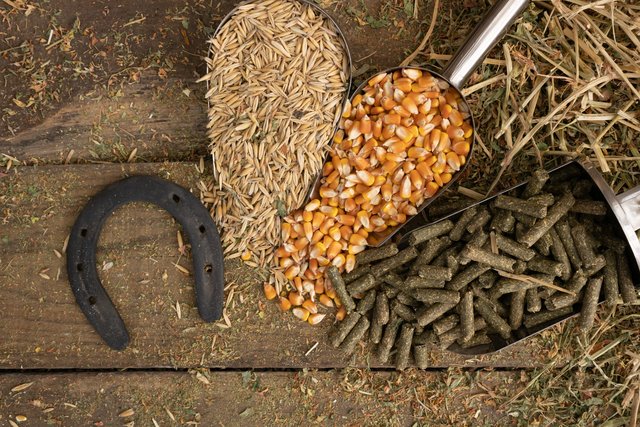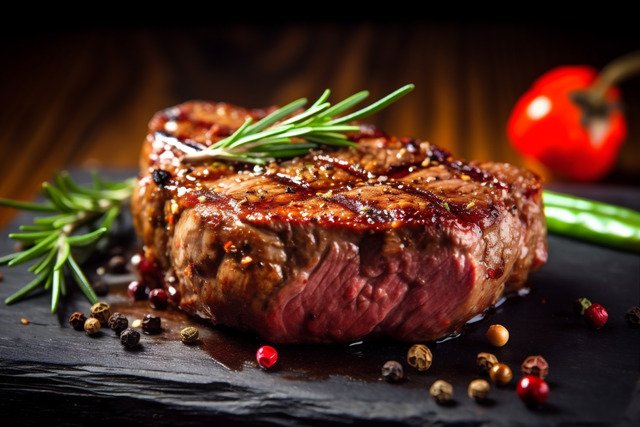There’s a long-standing debate in the equine world “Can horses eat meat?”. Lets Check.
While horses are herbivores by nature, capable of thriving on a diet of hay, grains, and fresh grass, some argue that an occasional intake of meat might provide additional nutrients.
Let’s examine into the controversial topic and explore the facts surrounding this hotly debated issue.
Historical Context
Even though horses are herbivores, biologically designed to thrive on a diet high in fibrous vegetation, their evolutionary history traces back to a time when they had omnivorous ancestors.
Traditional Diets of Horses
If we look at the traditional diets of horses, we see that they have primarily consumed grass, hay, and grains. These foods provide the necessary nutrients horses need to maintain their health and energy levels.
This is because the digestive system of horses is adapted for breaking down plant material, making them efficient at extracting nutrients from vegetation.
Historical Accounts of Meat Consumption
Even though modern domesticated horses are herbivores, historical accounts suggest that wild horses have been observed engaging in cannibalistic behavior under extreme circumstances.
Horses may have consumed meat opportunistically in the wild, but it is not a natural or necessary part of their diet.
Types of Diets for Horses
Any horse owner knows that a proper diet is important for the health and well-being of their equine companions.
Understanding the different types of diets available for horses is crucial in ensuring their nutritional needs are met.
Knowing the distinctions between herbivorous, omnivorous, and carnivorous diets can help horse owners make informed decisions about what to feed their animals.
| Herbivorous Diets | Omnivorous Diets |
| Grass, hay, and leafy plants are the primary sources of nutrition for herbivorous horses. | Omnivorous diets may include a combination of plant-based foods like fruits and vegetables, along with small amounts of animal protein. |
| Herbivorous horses have a specialized digestive system designed to process fibrous plant material efficiently. | An omnivorous diet for horses can provide a diverse array of nutrients to support their overall health and performance. |
| These diets are high in fiber and low in fat, providing horses with the energy they need for daily activities. | Omnivorous diets should be carefully balanced to ensure horses receive all important nutrients without overloading on any particular food group. |
| Herbivorous diets promote a healthy gut microbiome and help prevent digestive issues such as colic or impaction. | Diets that include a variety of foods can offer horses a well-rounded nutritional profile, supporting their immune system and overall well-being. |
Herbivorous Diets
Herbivorous diets are centered around plant-based foods such as grass, hay, and leafy plants.
These diets are important for horses as they provide the necessary fiber, vitamins, and minerals for their overall health.
Horses have evolved to thrive on herbivorous diets, utilizing their specialized digestive system to break down fibrous plant material efficiently.
Omnivorous Diets
An omnivorous diet for horses consists of a combination of plant-based foods like fruits and vegetables, along with small amounts of animal protein.
This type of diet can offer horses a diverse array of nutrients to support their overall health and performance.
It’s essential to carefully balance an omnivorous diet to ensure horses receive all important nutrients without missing out on any vital components.
Carnivorous Diets: Myths vs. Reality
Diets that include carnivorous elements have been a topic of debate among horse owners. While some believe that horses can benefit from small amounts of animal protein, others argue that sticking to a primarily herbivorous diet is important for their health.
It is crucial to differentiate between myths and reality when considering incorporating carnivorous elements into a horse’s diet, ensuring that their nutritional needs are met without compromising their well-being.
Biological and Anatomical Considerations
Digestive System of Horses
One important factor to consider when discussing whether horses can eat meat is their unique digestive system.
Horses are herbivores with a hindgut fermentation digestive system, which means that the majority of their digestion takes place in the large intestine.
Comparison with Other Herbivores
Comparison
| Horses | Cows |
| Hindgut fermenters | Foregut fermenters |
| Small stomach capacity | Large stomach capacity |
After considering the anatomical and biological factors, it is clear that horses are not evolutionarily designed to consume meat.
Their digestive systems, nutritional requirements, and overall physiology are best suited for a diet consisting of plant matter.
It is crucial to provide horses with a balanced diet that meets their specific nutritional needs to ensure their health and well-being.
Factors Influencing Diet Choices

Many factors play a crucial role in shaping a horse’s diet choices. These include:
- Environmental factors
- Availability of nutritional resources
- Horse breed and genetic factors
Environmental Factors
Assuming a horse is kept in its natural habitat, environmental factors such as the availability of grass, plants, and water sources will greatly influence its diet preferences. After all, horses are herbivores that have evolved to graze on vegetation rich in fiber.
Availability of Nutritional Resources
Factors such as the quality and quantity of available forage can significantly impact a horse’s diet.
Nutritional deficiencies or excesses in the surrounding environment may lead horses to seek alternative food sources, sometimes even resorting to consuming meat.
Horse Breed and Genetic Factors
You will see that different horse breeds have varying nutritional requirements based on their evolutionary history and genetic makeup.
Knowing the breed and genetic predispositions of your horse can help tailor its diet to meet specific needs.
Knowing the nutritional needs of your horse’s specific breed can guide feeding decisions.
Pros and Cons of Feeding Horses Meat
| Potential Benefits | Potential Risks |
| – Protein source | – Digestive issues |
| – Nutrient diversity | – Behavioral changes |
| – Increased energy levels | – Nutritional imbalances |
| – Improved muscle development | – Allergic reactions |
Potential Benefits
Horses can benefit from the high protein content in meat, which supports muscle development and overall health.
Additionally, meat can provide a diverse array of nutrients that may not be present in their regular diet, promoting better energy levels and performance.
Potential Risks
Cons of feeding horses meat include the potential for digestive issues due to their herbivorous nature. Behavioral changes, such as increased aggression, can also occur.
Furthermore, the risk of nutritional imbalances and allergic reactions poses a threat to their well-being.
Practical Tips and Step-by-Step Guide
Now, we will provide you with some practical tips and a step-by-step guide to help you navigate the controversial topic of whether horses can eat meat.
Assuming you have decided to incorporate meat into your horse’s diet, ensure you source high-quality lean meats such as cooked chicken or fish. Avoid processed meats or those high in fat, salt, or seasonings.
Gradual Introduction to Meat
Appropriate introduction of meat into a horse’s diet is crucial to prevent digestion issues. Start by introducing small portions mixed with their regular feed.
Gradually increase the meat content over a few weeks to allow their digestive system to adjust.
Gradual introduction to meat can help your horse’s digestive system adapt smoothly to the new protein source.
Monitor their reaction and adjust the quantity based on their acceptance and well-being.
Monitoring Horse’s Health and Behavior
Now, it’s necessary to monitor your horse’s health and behavior closely after introducing meat into their diet.
Look out for any signs of digestive upset, such as colic, diarrhea, or changes in appetite.
Understanding your horse’s normal behavior and health baseline will help you recognize any deviations promptly.
Consult with a veterinarian if you notice any concerning changes in your horse after introducing meat to their diet.
Expert Opinions and Research Findings

Veterinary Perspectives
There’s a consensus among veterinarians that horses are herbivores by nature and their digestive systems are not designed to process meat.
Feeding horses a diet high in protein from meat can lead to digestive issues and health problems.
Nutritional Scientists’ Insights
If considering the nutritional aspect, horses can meet all their dietary requirements from a well-balanced plant-based diet.
Nutritional scientists emphasize that equine diets rich in quality forage, grains, and supplements can fulfill all the imperative nutrients horses need to thrive.
It is vital to note that horses have evolved as herbivores with specialized digestive systems adapted to break down fibrous plant material efficiently.
Adding meat to their diet may disrupt the delicate balance of their gut flora and negatively impact their overall health.
Case Reports and Anecdotal Evidence
With limited scientific research on the topic, case reports and anecdotal evidence suggest that feeding horses meat can result in gastrointestinal disturbances, such as colic and ulcers.
It is imperative for horse owners to err on the side of caution and stick to traditional herbivorous diets for their equine companions.
Plus, anecdotal evidence also indicates that horses may exhibit behavioral changes or show aversion to meat-based diets, further supporting the argument that horses are best suited to consuming plant-based foods.
Summing up
On the whole, the debate around whether horses can eat meat is largely controversial. While some argue that horses are naturally herbivores and should stick to a plant-based diet, others believe that occasional meat consumption can be beneficial in certain circumstances.
However, it is crucial to consider a horse’s digestive system and nutritional requirements before introducing any new foods, including meat, into their diet.
Consultation with a veterinarian or equine nutritionist is always recommended to ensure the health and well-being of your horse.
